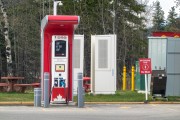For the past week or so, Ontarians have been grappling with high gas prices resulting from the uprisings in the Middle East. Some oil analysts warn that this has long-term oil price implications, putting our economic recovery at risk.
The Globe and Mail reported this week that rising oil prices are "creating new urgency for Ontario to reinvent itself" via a clean energy economy — citing the Government of Ontario's estimate that its Green Energy Act will create roughly 50,000 jobs to illustrate how investing in green energy can help fill the employment void created by the recent recession and the manufacturing industry's decline.
Finance Minister Dwight Duncan was quoted in the Globe article as saying: "As prices at the pump go up, consumers fill up the gas tank less often. This is a grave threat to the economy."
Contrary to Minister Duncan's fear, pumping less gas can actually be a good thing. The most effective and direct way to increase Ontario's resilience to oil prices is by reducing our dependence on oil.
Moreover, smart actions to reduce oil dependence can create tens of thousands more jobs in a clean transportation future.
Ontario's oil dependence
Ontario consumes one third of all the refined petroleum in Canada, and more than 80 per cent of that oil is used by the transportation sector. Ontario imports almost every drop. We are entirely dependent on oil imports to 'fuel' our mobility and our economy, which leaves us vulnerable to rising and fluctuating oil prices.
Every year, $13 billion leaves the province in exchange for transportation fuel imports. Reducing the amount of oil we import would keep money in the province that can be invested in transit and rail infrastructure, vehicle and fuel technology, and demand-management programs — policies that both reduce Ontario's dependence on imports and create clean transportation jobs.
Kick-starting Ontario's clean transportation economy
 Ontario is in an excellent position, possibly the best in Canada, to start making significant reductions in transportation fuel demand and building a clean transportation economy. We have everything in place: from a regional transit plan that just requires funding, to an electricity grid that is becoming greener and is ready to accommodate electric vehicles.
Ontario is in an excellent position, possibly the best in Canada, to start making significant reductions in transportation fuel demand and building a clean transportation economy. We have everything in place: from a regional transit plan that just requires funding, to an electricity grid that is becoming greener and is ready to accommodate electric vehicles.
A recent Pembina Institute report presents five key actions the Ontario government could take to reduce oil demand by 25 per cent in 20 years, mainly by expanding, funding or complementing existing policies and programs. In 10 years, the five actions presented in this report can save close to $1 billion per year by cutting the amount of imported oil.
For example, Metrolinx's regional transportation plan, the Big Move, can save over 5 billion barrels of oil every year and close to half a billion dollars in imports every year. Combined with tailpipe regulations, a simple feebate program to encourage the purchase and manufacturing of fuel-efficient vehicles could save roughly half a billion dollars a year. A suite of road-pricing and commuter options would not only reduce congestion and bring in revenue to help build transit, but these policies could save over $300 million in oil imports.
And this is just for "personal" transportation — how Ontarians get around every day — which accounts for the majority of all transportation fuel consumed. Ontario's 7 million cars and light trucks (such as SUVs and pickups) consume 86 million barrels of oil every year, and 2.5 million more cars and light trucks are expected to be added to Ontario's roads over the next 25 years. That influx is expected to increase greenhouse gas emissions, fuel consumption and local pollution, while adding strain to already untenable traffic congestion in urban regions.
Our report, Bridging the Gulf, identifies the low-hanging fruit. More meaty personal transportation solutions can follow, along with mechanisms to make trucking more efficient and cleaner.
Fueling a clean transportation economy
Major investments in public transit and intercity rail carry tremendous job-building potential for Ontarians. Metrolinx estimates that the Big Move would create 430,000 jobs and generate approximately $70 billion in business revenue.
 Fifty per cent of Canada's railway manufacturing capacity is in Ontario, and the GTA has the capacity to manufacture parts for large transit vehicles for our own procurement. We could be manufacturing electric buses for our own roads — just as some companies already do in Quebec.
Fifty per cent of Canada's railway manufacturing capacity is in Ontario, and the GTA has the capacity to manufacture parts for large transit vehicles for our own procurement. We could be manufacturing electric buses for our own roads — just as some companies already do in Quebec.
Together, Ontario's green grid and prominent auto manufacturing sector can support the production and procurement of electric vehicles and infrastructure.
Ontario doesn't have to suffer the shocks of unstable oil prices. Reducing our demand for oil with smart transportation policies will strengthen our economy, create new jobs, and enable Ontarians to take meaningful action on issues such as climate change and air pollution.






